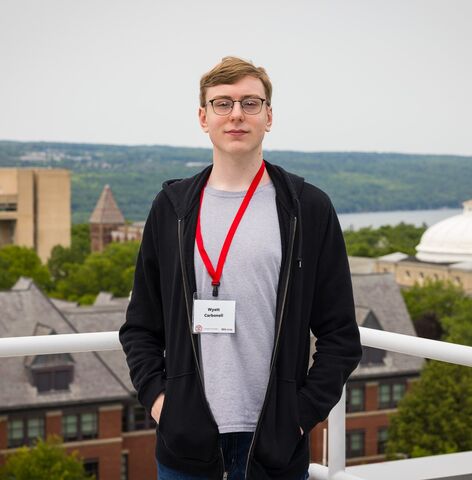Wyatt Carbonell REU 23

Home Institution: Connecticut College
Program: REU at CLASSE
Semester: Summer 2023
Expected Graduation Year: 2024
Mentor(s): Jim Crittenden
Q&A
What is your home institution and your expected graduation year?
I am a rising senior at Connecticut College, and expect to graduate in 2024.
Which CLASSE summer program are you a part of and who is your mentor?
I am working as part of the CLASSE REU program with Jim Crittenden.
What is the research you are engaged in and what have you accomplished so far this summer? What are you hoping to accomplish by the end of your project?
In broad terms, I am studying our ability to take a measurement of the width of the positron beam inside the Cornell Electron Storage Ring. We vary the strength of sextupole magnets in the storage ring, and use observations of the effect on the beam to infer its width. This is a new measurement technique being developed, and my role is to study systematic problems with our measurement, as well as to understand how precise we can expect our measurement to be. By the end of the project, I hope we will have a good understanding of how useful this measurement method will be in comparison to existing ones.
What are the impacts of your research for the general public?
Particle accelerators as a whole are used for many things that benefit the general public – welding for specialized parts, cancer treatments, and even water purification. The work I am doing is probably of more interest to physicists than the general public, but I hope that it will assist in the development of better particle accelerators in the future.
What are you enjoying most about this research/summer experience?
I think the best thing about this REU is the ability to work at the forefront of physics in a welcoming and supportive environment. While the work I am doing has its challenges, I can always rely on my mentor or larger research group for help when I get stuck on something I can’t figure out. I always appreciate the feedback I receive regarding my work, particularly the help with presenting and paper writing.
What are you finding the most challenging about this research?
The most challenging thing about research is learning to accept being wrong. When posed with a problem, it is very unlikely that the first thing you think of is the solution. The same is true of research – it feels like there is always a problem to solve, and there is always a mountain of failed ideas piled behind you. It can be discouraging at first to feel like there is no solution, but it is also very rewarding when you can eventually track it down.
How has this experience changed your view about being a researcher?
I think most undergraduate students have an idea in their head about what research must be like, and it is founded on their experience of physics. For most of us, an undergraduate physics curriculum is very theoretical. Except for a dedicated experimental physics class, everything we do is equations and numbers and solving problems that have definite answers. Even the experiments we do in a lab for class are somewhat guaranteed to go the way you expect. I realize now that research does not follow these same rules; things often don’t work, and it could be due to some complicated physics no one knows about yet, or just a simple hardware malfunction. Research isn’t about getting things right. In fact, most of the time research is about getting things wrong. The thing that makes research special is finding answers to questions that no one thought to ask until now, which can have a great positive impact on the world.
